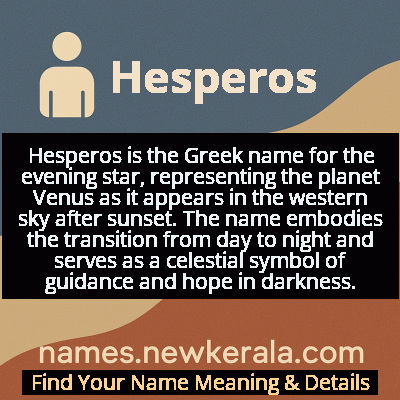Hesperos Name Meaning & Details
Origin, Popularity, Numerology Analysis & Name Meaning of Hesperos
Discover the origin, meaning, and cultural significance of the name HESPEROS. Delve into its historical roots and explore the lasting impact it has had on communities and traditions.
Name
Hesperos
Gender
Male
Origin
Greek
Lucky Number
6
Meaning of the Name - Hesperos
Hesperos is the Greek name for the evening star, representing the planet Venus as it appears in the western sky after sunset. The name embodies the transition from day to night and serves as a celestial symbol of guidance and hope in darkness.
Hesperos - Complete Numerology Analysis
Your Numerology Number
Based on Pythagorean Numerology System
Ruling Planet
Venus
Positive Nature
Harmonious, responsible, caring, and artistic.
Negative Traits
Overly idealistic, superficial, possessive, or jealous.
Lucky Colours
Pink, turquoise.
Lucky Days
Friday.
Lucky Stones
Diamond, turquoise.
Harmony Numbers
2, 3, 9.
Best Suited Professions
Artists, musicians, teachers, healthcare workers.
What People Like About You
Warmth, nurturing nature, artistic flair.
Famous People Named Hesperos
Hesperos of Alexandria
Ancient Astronomer
Early Greek astronomer who documented Venus's movements and established its identity as both morning and evening star
Hesperos the Poet
Lyric Poet
Minor Greek poet known for odes to celestial bodies and evening themes, influencing later Hellenistic poetry
Hesperos Nikolaidis
Modern Scholar
Greek philologist specializing in ancient astronomical texts and mythological interpretations of celestial deities
Name Variations & International Equivalents
Click on blue names to explore their detailed meanings. Gray names with will be available soon.
Cultural & Historical Significance
The Hesperides, nymphs of the evening and golden light of sunsets, were considered his daughters in some traditions, guarding golden apples in a far western garden. This connection places Hesperos at the mythological intersection of astronomy, navigation, and the daily rhythms of ancient life. The name's cultural importance extends to its role in timekeeping and seasonal awareness, as the appearance of the evening star marked the end of the workday and beginning of evening activities in ancient Mediterranean societies.
Extended Personality Analysis
Individuals named Hesperos are often perceived as contemplative, mysterious, and possessing a quiet wisdom. They tend to be observers rather than participants, with a natural inclination toward introspection and philosophical thought. Like the evening star they're named for, they often shine brightest in calm, reflective environments and may possess a calming presence that brings closure to chaotic situations.
Their personality typically combines artistic sensitivity with analytical thinking, making them excellent at seeing patterns and connections that others miss. While they might appear reserved initially, they reveal depth and warmth to those who take the time to know them, much like the gradual brightening of the evening star against the darkening sky. They often exhibit patience, consistency, and reliability—qualities mirrored in the dependable nightly appearance of their namesake celestial body.
Modern Usage & Popularity
Hesperos remains a rare but meaningful choice in modern naming, primarily used by parents with interests in classical studies, astronomy, or Greek heritage. While it doesn't appear on mainstream popularity charts, it has seen a slight increase in usage among academic and artistic communities. The name is occasionally adopted by families seeking a distinctive mythological name that isn't as common as Apollo or Orion. In contemporary Greece, it's sometimes used as a traditional name in rural areas or by families preserving ancient naming customs. The name's rarity makes it appealing to parents looking for a unique but historically grounded option with celestial significance, though its usage remains limited to those specifically seeking out mythological or astronomical names.
Symbolic & Spiritual Meanings
Hesperos symbolizes transition, guidance, and the beauty found in endings and new beginnings. As the evening star, it represents the bridge between day and night, light and darkness, action and reflection. Metaphorically, it signifies hope in darkness, consistency amid change, and the promise that light returns after periods of obscurity. The name carries connotations of navigation and direction—both literal and spiritual—serving as a celestial guide that has oriented travelers for millennia. It also embodies the concept of cyclical renewal, as the evening star reliably appears each night, reminding observers of nature's dependable patterns and the eternal return of light after darkness, making it a powerful symbol of perseverance and cosmic order.

